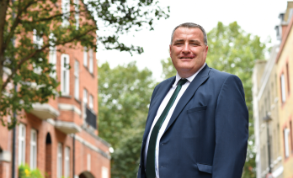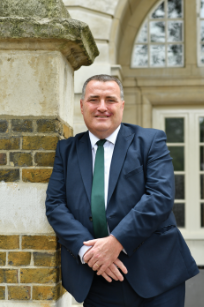Feature / Future vision
Besides the considerable issue of caring for patients with Covid, the priorities for the health service over the next year will undoubtedly include integration and reducing waiting lists. It would seem timely, then, that new HFMA president Owen Harkin has plenty of experience of both of these issues.
Mr Harkin (pictured), who is director of finance and estates, and deputy chief executive of the Northern Health and Social Care Trust in Northern Ireland, says his presidential theme, Reimagining the future, aims to reflect current issues facing health and care across the UK. But it also highlights the opportunities to adopt permanently the positive steps taken during the pandemic, and think again about how future health and care could look.
Three priorities
There are three parts to the theme – the short term (getting over the Covid crisis and recovery); longer term changes to the NHS; and the future of the HFMA.
In the short term, there are many challenges. The health service was running hot well before Covid, even more so in Northern Ireland where waiting times were, and remain, the longest in the UK. Mr Harkin says the pandemic hasn’t fully gone away, and the need to continue to care for Covid patients while switching services back on to tackle waiting lists has been challenging for staff.
He adds: ‘Winter is coming, and naturally we are asking how we will get through it. How can we stabilise the system to get ourselves through the next few months, and then look to move forward from there?’
Though the system locally has seen financial support through Covid, as with elsewhere, this is a short-term fix to help the service through the pandemic. There is a need for longer-term reviews of finance and workforce planning in order to address the significant staff shortages in medical, nursing and social care staff that exist across the UK. Social care, in particular, needs a clear strategy to build a sustainable and robust workforce across all service areas, including in independent sector care homes and domiciliary care.
‘We must take a longer-term strategic view to give us some confidence that we will have sufficient numbers in our workforce for the future, and we must build in sufficient flexibility to deal with issues that may arise, such as a future pandemic,’ he says.
Financial regimes could change as the threat of the pandemic recedes, Mr Harkin adds. ‘I think we might do things differently, back to more of a push to greater real productivity and not just efficiency savings. Are we delivering services at a system level in the best way we possibly can? If we’re not funded to the levels we think we need, then we must have an honest conversation on the services the public should expect. That would be a more proactive approach; engaging the public and encouraging them to take more control over their health.’
During the pandemic, the focus has been on delivering services rather than, as in recent years, the close monitoring of finances. ‘Finance teams had a reputation for control and grip, but now the challenge will be to try to get that corporate grip back in organisations. Where money hasn’t been such an issue for the past two years, it’s also going to become about waiting lists and a performance focus – and rightly so – especially in the run-up to the next general election.
‘Finance teams in the coming months will have a key role to play in maintaining credibility, control, and confidence. We must make sure we are as efficient as we can be, making sure we are not running too hot, while demonstrating efficiency and effectiveness to aid the case for the resources required, and prove that we will use them as effectively as we possibly can.’
Covid changed a lot, he says, and services must think about how the pandemic could alter their long-term development. ‘We have to look at what went well – and a lot did go well. A lot of barriers were torn down last year, between professions, divisions and sectors.
‘They fell away because they had to,’ Mr Harkin adds. ‘I think there’s an opportunity to maintain that collaborative working, which we had at all levels, to deliver the best service we can to our local populations. That’s why we are here.
‘It should not be about professional priorities, but engaging to deliver the best possible care. It might mean us being more flexible about the delivery of services, or asking if people are working to the top of their skills and professional accreditation with associated flexibility in skill mix, given the realities of workforce challenges.’
Integration gains
Health and social care have been integrated for the best part of 50 years in Northern Ireland, but Mr Harkin insists integration offers opportunities to work across organisations as well as within them. For example, clinicians could work across different organisations and across secondary and primary care. Finance staff have a part to play in facilitating these flexibilities to support the delivery of services.
‘Throughout Covid, finance staff have really stepped up, delivering with colleagues in areas such as personal protective equipment (PPE) procurement and distribution, fit testing, and oxygen monitoring, maintaining financial services while many worked remotely,’ he says.
‘Finance staff have proven ability in solving problems quickly while establishing robust processes and monitoring. Finance teams’ credibility has increased during Covid, and we must use that engagement with clinicians in a positive way in the future.’
He is convinced each part of the UK has something to teach health and care services in the other nations, and the HFMA has a key role in bringing them together.
An initial meeting of senior finance staff from the devolved nations took place in November, and Mr Harkin hopes this will develop into a useful forum for all parts of the UK.
HFMA strategy focus
The third part of his theme focuses on the HFMA, which will release a new three-year strategy during his term. He says the association has come through a difficult two years, thanks to the leadership of 2020 and 2021 president Caroline Clarke and chief executive Mark Knight. But now is a good time to review the strategy on the association’s activities, including research and education.
Mr Harkin has been working on a sub-committee looking at the association’s qualifications, and its recommendation, which will take effect in the January intake, will recognise the integration agenda.
He is also keen that the HFMA supports colleagues through the demise of clinical commissioning groups.
‘We can support our colleagues as they face the organisational challenges of the move to integrated care systems, helping them to prepare for the change, help with interviews, help them understand the new model,’ he says.
The HFMA is well respected for its research on financial challenges, the financing of the NHS, and health and social care integration, for example, and Mr Harkin would like to see the association taking a leading role in health and care, speaking up where appropriate.
‘We have an opportunity to engage with those in power – NHS England and NHS Improvement and the departments of health – to influence their thinking,’ he says.
‘We need to be willing, when the occasion is right, to speak truth to power. I would like to develop our role as influencers – up and down. Within the HFMA membership, we have a massive network of NHS finance experts. We need to try to harness that and use it.’
As he embarks on his year as president, Mr Harkin recognises the personal challenge presented by being largely based in the Northern Irish system – but it is a challenge he is willing to face, knowing that he can rely on the support of the HFMA team and fellow trustees from the NHS in England, Scotland and Wales.
He is also grateful for the support of his own trust and the directors of finance across Northern Ireland.
‘I am looking forward to it. It’s a massive honour, especially because I will be only the second person from Northern Ireland to be HFMA president,’ concludes Mr Harkin.
‘I believe the HFMA is about the members and the branches, and that’s why I want to do my bit and get to as many branch conferences as I possibly can.’
Public sector career
‘I joined health and social services in 1988 as it was the first place that offered me a job,’ says Owen Harkin with a chuckle.
He had applied for a number of vacancies, having recently graduated from the University of Ulster. ‘I wanted to be in something on the management accounting side of things. I wanted to be CIMA as I found management accounting to be more interesting. I loved working with budget-holders regularly – nurse managers, social care managers – and forecasting.
‘The health service has been very good to me. I was supported through day release to complete my accountancy qualification (CIMA) in two years. I owe the health service for that. And I met my wife in the health service.’
Mr Harkin began his career in the finance department of the Western Health and Social Services Board in Derry, and, over the following 16 years, progressed through a series of finance roles in the health service across Northern Ireland.
He had a six-year spell as a chief finance officer in the local education sector from 2004 to 2010. But he was keen to return to the health service, and joined the Health and Social Care Board – the commissioner for the whole of Northern Ireland – in 2010 as assistant director of finance working with Paul Cummings. Mr Cummings was HFMA chair in 2003. Mr Harkin’s time at the board included a year as acting director of finance.
‘When I was in education, I missed health and I missed the HFMA. Education didn’t have the same network, though I organised some regional finance training and used some of the HFMA’s contacts. The first thing I did when I went back into health was to rejoin the HFMA.’
Mr Harkin took up his current position as director of finance and estates with Northern Health and Social Care Trust in 2015, and then assumed the role of deputy chief executive in April 2020.
This coincided with the pandemic and his lead role in procuring PPE and, more recently, leading the trust vaccination programme.
The deputy chief executive role has been an ‘amazing experience’, he says, working across the entire organisation. ‘I believe in change and stretching yourself – that’s why I took on the estates function then the deputy chief executive role. It is an honour to be in such a lead role in an organisation with an amazing range of talented and committed professionals, all working to provide the best possible care to the most vulnerable in our community.’
Related content
We are excited to bring you a fun packed Eastern Branch Conference in 2025 over three days.
This quarterly forum will give CFOs national updates and attendees can discuss pressing issues with colleagues across the healthcare system.